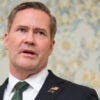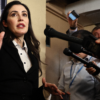Almost as heartbreaking as burning books, a move by the Minnesota Office of Higher Education will rank among those incomprehensible moments in human history when we seem to be handicapping ourselves for no reason.
Lifelong learners, students wanting supplemental courses, professionals, and Americans across the country interested in enrolling in physics, history, music, and a variety of other courses can do so for free from the open-source provider Coursera. But Minnesota has just informed its residents that they are now prohibited by law from furthering their own education for free through courses offered on Coursera by the likes of Stanford, Duke, Princeton, and more than a dozen other universities.
As several reports have noted, the Chronicle of Higher Education first reported the following:
The Daily Signal depends on the support of readers like you. Donate now
Notice for Minnesota Users:
Coursera has been informed by the Minnesota Office of Higher Education that under Minnesota Statutes (136A.61 to 136A.71), a university cannot offer online courses to Minnesota residents unless the university has received authorization from the State of Minnesota to do so. If you are a resident of Minnesota, you agree that either (1) you will not take courses on Coursera, or (2) for each class that you take, the majority of work you do for the class will be done from outside the State of Minnesota.
While students who enroll in a Coursera class cannot get college credit (although they can request that a professor send an email to a prospective employer, for instance, confirming that they took the course and reporting their success), models like Coursera are beginning to change the way Americans think about higher education and provide a huge opportunity to reduce costs and improve access.
Coursera—and others such as EdX (a Harvard/MIT online collaboration), Udacity, and Udemy—represent a shift in higher education toward credentialing content knowledge. Such a shift lays the groundwork for a revolution in higher education, allowing students to attain various credentials by demonstrating content and knowledge mastery from a variety of course providers. But that (literally) free pursuit of knowledge for their own personal edification or skill attainment is no longer available to Minnesota residents.
Online learning is, to quote education experts Terry Moe and John Chubb, the “single biggest change in education since the printing press.” Johannes Gutenberg—the father of that printing press—probably shed tears the first time he learned of a book burning. This most recent restriction of access to knowledge should likewise distress us all.



























